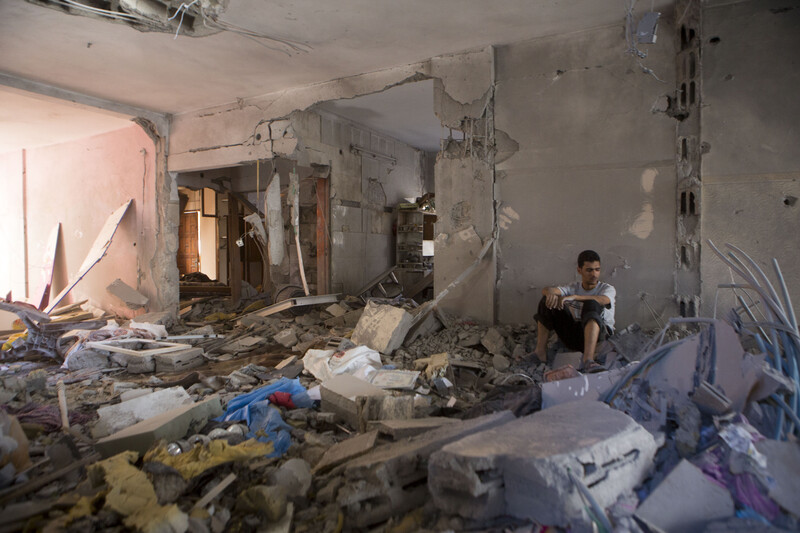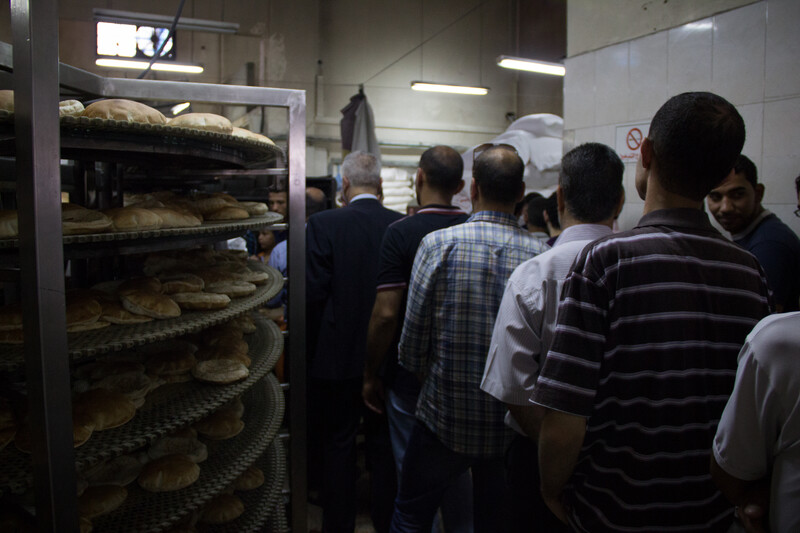The Electronic Intifada Gaza Strip 19 July 2014

The sun rises over the Gaza Strip on Saturday, 19 July.
APA imagesThree weeks before this attack, I had the long-awaited chance to spend a week in the occupied West Bank and the 1948 territories (present-day Israel). I wanted to write about this marvelous experience of life and laughter, but now I am writing about death and sorrow.
Two days before the attack, I was supposed to travel to Geneva to participate in a summer school training program for which I have been preparing for seven months and which concludes today. I booked two flights both from Egypt and Jordan, but missed both. The Israelis never approved my permit to travel through Erez checkpoint in the north of Gaza, even though I applied three times, and Rafah crossing, the southern land border with Egypt, has been consistently sealed off. I am not attending the course, though I still receive emails related to it.
Instead, I am living this war.
It couldn’t be possible
News about a looming war on Gaza was in the air before it started on 8 July. I work for an international nongovernmental organization and on Monday, 7 July, our deputy field coordinator held an urgent meeting to discuss the organization’s contingency plan, emergency responses and the “safety” procedures that the staff has to follow.
One of these procedures was to take all your important belongings with you. I didn’t take it seriously and just thought that he was exaggerating. We had a war only two years ago — it couldn’t be possible to have another one so soon, especially since there was still a truce between Hamas and Israel and the latter had been facing critical confrontations with Palestinian youth in the West Bank and 1948 territories.
It seems that my mind didn’t process the deputy field coordinator’s instruction and just buried it in my subconscious. I deliberately left my laptop at the office. Don’t think of me as a careless person, usually I am not. Maybe it was my wishful thinking that the following day would be as normal as the previous one. Or maybe it was an inexplicable personal defiance of my own fears.
“Dancing” house
On Tuesday, 8 July, at 3:10am, I woke up to reality.
I jumped up from my bed as the house shook — or, rather, started “dancing,” as we described it — as a result of a huge airstrike. The first word I uttered when I suddenly opened my eyes, was “Khalas [that’s it], it is war.” I rushed to open my Facebook account and wrote the same sentence.
As I write these words, a huge airstrike hit a house in our neighborhood. Though it is not close to my house, I see our walls crack in front of my eyes. Tariq, my ten-year-old brother, says to me, referring to Israel’s winter 2008-09 and November 2012 onslaughts on Gaza, “Ayah, most of our house’s walls just got cracked — this didn’t happen in the previous two wars, did it?”
Israel is systematically targeting houses. It is obvious. The number of demolished houses, along with the number of the dead and injured, rises so quickly that I find it impossible to write a number. Our houses are like human beings, and Israel is murdering them along with the memories of everything inside them. It is mass murder, and it reminds me of Mahmoud Darwish’s line of poetry: “our things die like us, but they don’t get buried with us.”
I write a sentence and then I leave the computer and the whole room.
We love life
What is most terrifying is the perception of the normality and familiarity of war(s) on Gaza. It happened in 2009, 2012 and now in 2014, but it shouldn’t be the norm. It should never be thought that Palestinians in Gaza have gotten used to wars. We love life.
Ibrahim al-Batsh wrote on Twitter on 26 June: “I finally finished my high school exams, and I pray for success after all that hard work studying! Please pray for me and all students.”
On 15 July, last Tuesday, all the results from the high school exams were announced, including Ibrahim’s. But he, along with other 18 martyrs, would never know them. Two days before the much-anticipated announcement, Ibrahim, together with his mother, father and 15 more members of their family, were killed by Israeli missiles.
Another student, Belal Abu Yousef, earned 95 percent on his exam. Instead of receiving congratulations, he was accepting condolences of the martyrdom of his two brothers, Ahmad and Mohammed.
State terror
What we are experiencing is state terrorism. Just the other day, my mother wanted to visit my grandmother, who lives nearby. Tariq, my brother, begged her not to leave the house. He shouted, “Mom, please don’t go out. Things are escalating, can’t you hear the bombings?! Can’t you see the news?”
We have all been unable to sleep, especially at night. Four hours after the ground invasion was announced on Thursday, I was feeling terribly tired. I tried to sleep. But as soon as I closed my eyes, I started imagining a missile penetrating the ceiling — not killing me, but causing me a lifelong disability. It was a horrible feeling and I couldn’t fall asleep. Honestly, I have always thought of myself as a strong person. Now, I search for a bit of my strength.
For the past eleven days, I was strong enough to answer Tariq when he asked me about a pool of blood in a picture he saw on my Facebook page. I told him it was a photo of the blood of a calf that was slaughtered, but in fact it was the blood of children in Gaza the same age or even much younger than him.

A man sits in a building in the al-Tuffah neighborhood of Gaza City which was destroyed the previous night in an Israeli airstrike, 16 July.
ActiveStillsMeanwhile, the terror we are being subjected to is being described in euphemisms. Take for example the “roof knocking” technique used by the Israeli military. The term “warning missile” has been very widely used both in casual conversation and by media outlets to mean that Palestinian civilians are being warned of an impending strike, giving a false impression of the morality of the Israeli army. The correct term is “guidance missile” since its real function is to instruct the Israeli Air Force where to hit. It is provided by surveillance cameras used to confirm the intended target. After one minute, at most, the house is leveled.
At the time of this writing, we are in the twelfth day of this murderous attack, and my legs can’t bear to hold me up anymore. We all were taking about a truce, or a ceasefire — or to put it accurately, a stop to the Israeli aggression. We were looking forward to hearing it announced. Instead, we heard Israeli Prime Minister Benjamin Netanyahu declaring the start of the ground invasion.
We knew
But we knew of the ground invasion before the formal announcement. We heard the sounds of heavy Israeli shelling; on TV and social media we saw the images of children without heads. And before all of that, we heard the sounds of the drones getting louder in a crazy way, as if they were on steroids.
Their sound and volume has become an indicator for us as to what is coming. Early in the morning Thursday, for example, after declaring the five-hour “humanitarian ceasefire,” I could hardly hear the sounds of the drones for the first time since the beginning of the attack. Now they are piercing my ears.
I have always contemplated these drones during the days of the attack. Sometimes, when I can’t stand being inside the house, I would go to the roof and watch them while my father would demand that I come down because they can target us (on Thursday, three children from the Shuhaibar family in the Sabra neighborhood of Gaza City were killed while they were playing on their roof).
I look at the drones and think of what an airplane represents in any other place. There, they are a means of transport that facilitate people’s lives. Here, in Gaza, they are a constant source of danger as they may kill you if they identify you as a threat, so much easier and quicker than you could ever imagine.
Meanwhile, Gaza is now in absolute darkness with most households receiving only up to four hours of power per day as Israeli bombing has badly damaged the electricity infrastructure. At night, the only source of light comes from artillery flares illuminating the sky as people are being butchered. I won’t even be able to see this writing published; I feel I am dying without electricity. How will we spend these long days and nights trapped in our homes without it?

Palestinians crowd into a Gaza City bakery during a brief “humanitarian ceasefire” prior to the Israeli ground invasion, 17 July.
ActiveStillsReturning to the “humanitarian ceasefire,” it is worth mentioning that we have been suffocating indoors. People hardly leave their houses. Though it is Ramadan and people usually shop and pray at their mosques a lot during this holy month, they haven’t been doing the same this year.
Many mosques, streets and even taxis have been targeted by Israel. I haven’t been outside except during the “humanitarian ceasefire” as my international organization had to deliver emergency supplies to affected people. On my way, I saw lots of people leaving their homes during these hours. They were going to stock up on food, withdraw money from the bank and check in on family — even though they know that a ceasefire with Israel can hardly be trusted.
It was right during the last hours of this truce that Israel attacked areas in Khuzaa, east of Khan Younis.
Your entire life feels upside down. In such times, you don’t know when you can sleep and when you will wake up. Your sense of time becomes completely different. Minutes and seconds may (not) separate you from life and death, between loved ones and their ghosts, between a house and taking a photo beside its debris.
Taking power
We all pray that we don’t become one of Gaza’s numbers. After surviving the 2008-09 onslaught on Gaza, during which I felt so powerless, I joined the Palestinian movement for boycott, divestment and sanctions (BDS) on Israel, giving me a renewed sense of optimism and sense of power. I also survived also the ruthless assault on Gaza in 2012. Now I am living the Israeli horror of 2014 which coincides with the ninth anniversary of the BDS call and the tenth anniversary of the International Court of Justice’s declaration of the illegality of Israel’s apartheid wall in the occupied West Bank.
Not only does Israel’s brutality intensify the growing BDS movement, they also shatter the illusion that — after more than twenty years of “peace process”— Israel has any intention of peace.
We don’t want half or a quarter of justice. We need complete justice that is equivalent to the amount of the blood, destruction and loss we’ve suffered in the Gaza Strip.
Ayah Abubasheer holds a master’s degree in global politics from the London School of Economics and Political Science (LSE). She is a member of the Gaza-based organizing committee for boycott, divestment and sanctions against Israel and a supporter of the One Democratic State Group.





